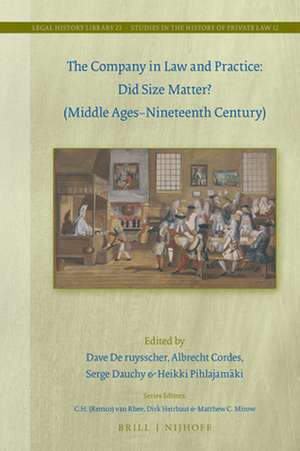The Company in Law and Practice: Did Size Matter? (Middle Ages-Nineteenth Century): Legal History Library / Studies in the History of Private Law, cartea 23/12
Editat de Dave De ruysscher, Albrecht Cordes, Serge Dauchy, Heikki Pihlajamäkien Limba Engleză Hardback – 5 sep 2017
Contributors are: Anja Amend-Traut, Luisa Brunori, Dave De ruysscher, Stefania Gialdroni, Ulla Kypta, Bart Lambert, Annamaria Monti, Carlos Petit, and Bram Van Hofstraeten.
Preț: 605.73 lei
Preț vechi: 738.70 lei
-18% Nou
Puncte Express: 909
Preț estimativ în valută:
115.92€ • 125.87$ • 97.37£
115.92€ • 125.87$ • 97.37£
Carte indisponibilă temporar
Doresc să fiu notificat când acest titlu va fi disponibil:
Se trimite...
Preluare comenzi: 021 569.72.76
Specificații
ISBN-13: 9789004348493
ISBN-10: 9004348492
Dimensiuni: 155 x 235 mm
Greutate: 0.48 kg
Editura: Brill
Colecția Brill | Nijhoff
Seria Legal History Library / Studies in the History of Private Law
ISBN-10: 9004348492
Dimensiuni: 155 x 235 mm
Greutate: 0.48 kg
Editura: Brill
Colecția Brill | Nijhoff
Seria Legal History Library / Studies in the History of Private Law
Cuprins
Acknowledgments
List of Figures and Tables
Introduction
Dave De ruysscher, Albrecht Cordes, Serge Dauchy and Heikki Pihlajamäki
1 What is a Small Firm? Some Indications from the Business Organization of Late Medieval German Merchants
Ulla Kypta
2 Making Size Matter Less: Italian Firms and Merchant Guilds in Late Medieval Bruges
Bart Lambert
3 Late Scholasticism and Commercial Partnership: Persons and Capitals in the Sixteenth and Seventeenth Centuries
Luisa Brunori
4 Legal Structure of Early Enterprises—from Commenda-like Arrangements to Chartered Joint-Stock Companies (Early Modern Period)
Anja Amend-Traut
5 Delving for Diversity in Early Modern Company Law: Mining Companies in Seventeenth-Century Liège
Bram Van Hofstraeten
6 Incorporation and Limited Liability in Seventeenth-Century England: The Case of the East India Company
Stefania Gialdroni
7 From Commercial Guilds to Commercial Law: Spanish Company Regulations (1737–1848)
Carlos Petit
8 Partnerships as Flexible and Open-Purpose Entities: Legal and Commercial Practice in Nineteenth-Century Antwerp (c. 1830–c. 1850)
Dave De ruysscher
9 Form, Size, “Governance”: Remarks on Italian Late Nineteenth-Century Companies
Annamaria Monti
Index
List of Figures and Tables
Introduction
Dave De ruysscher, Albrecht Cordes, Serge Dauchy and Heikki Pihlajamäki
1 What is a Small Firm? Some Indications from the Business Organization of Late Medieval German Merchants
Ulla Kypta
2 Making Size Matter Less: Italian Firms and Merchant Guilds in Late Medieval Bruges
Bart Lambert
3 Late Scholasticism and Commercial Partnership: Persons and Capitals in the Sixteenth and Seventeenth Centuries
Luisa Brunori
4 Legal Structure of Early Enterprises—from Commenda-like Arrangements to Chartered Joint-Stock Companies (Early Modern Period)
Anja Amend-Traut
5 Delving for Diversity in Early Modern Company Law: Mining Companies in Seventeenth-Century Liège
Bram Van Hofstraeten
6 Incorporation and Limited Liability in Seventeenth-Century England: The Case of the East India Company
Stefania Gialdroni
7 From Commercial Guilds to Commercial Law: Spanish Company Regulations (1737–1848)
Carlos Petit
8 Partnerships as Flexible and Open-Purpose Entities: Legal and Commercial Practice in Nineteenth-Century Antwerp (c. 1830–c. 1850)
Dave De ruysscher
9 Form, Size, “Governance”: Remarks on Italian Late Nineteenth-Century Companies
Annamaria Monti
Index
Notă biografică
Dave De ruysscher, Ph.D. (2009), is Associate Professor at Tilburg University and at Vrije Universiteit Brussel. Being legal historian and lawyer, he specializes in the history of commercial and private law of the early modern period and the nineteenth century.
Albrecht Cordes is Professor of Medieval and Early Modern Legal History and Civil Law at the Goethe University Frankfurt/Main. His research is especially focused on the history of commercial law, Hanseatic legal history and the history of conflict resolution.
Serge Dauchy is Research Director at the CNRS (Lille-France) and Professor of Legal History at the University Saint-Louis of Brussels. His main research topics are the history of civil procedure, comparative history of central courts and the history of Québec.
Heikki Pihlajamäki is Professor of Comparative Legal History at the University of Helsinki. He has published extensively on the legal history of Scandinavia, Europe and America, including Conquest and the Law in Swedish Livonia (ca. 1630 – 1710): A Case of Legal Pluralism in Early Modern Europe (Brill, 2017).
Albrecht Cordes is Professor of Medieval and Early Modern Legal History and Civil Law at the Goethe University Frankfurt/Main. His research is especially focused on the history of commercial law, Hanseatic legal history and the history of conflict resolution.
Serge Dauchy is Research Director at the CNRS (Lille-France) and Professor of Legal History at the University Saint-Louis of Brussels. His main research topics are the history of civil procedure, comparative history of central courts and the history of Québec.
Heikki Pihlajamäki is Professor of Comparative Legal History at the University of Helsinki. He has published extensively on the legal history of Scandinavia, Europe and America, including Conquest and the Law in Swedish Livonia (ca. 1630 – 1710): A Case of Legal Pluralism in Early Modern Europe (Brill, 2017).
Recenzii
''Overall, this collection shows the value of discussing concepts explicitly. It creates some much-needed clarity, and this is perhaps the best way of establishing differences and similarities for comparative legal and historical research.The volume’s contributions show the way that legal study, through its demand for precision in language and its definition and meaning, can inform business and economic history;it is a fruitful example of how legal history can be combined with business and economic history''. Victoria Barnes, in Legal History , 27 (2019), pp.322-324.










